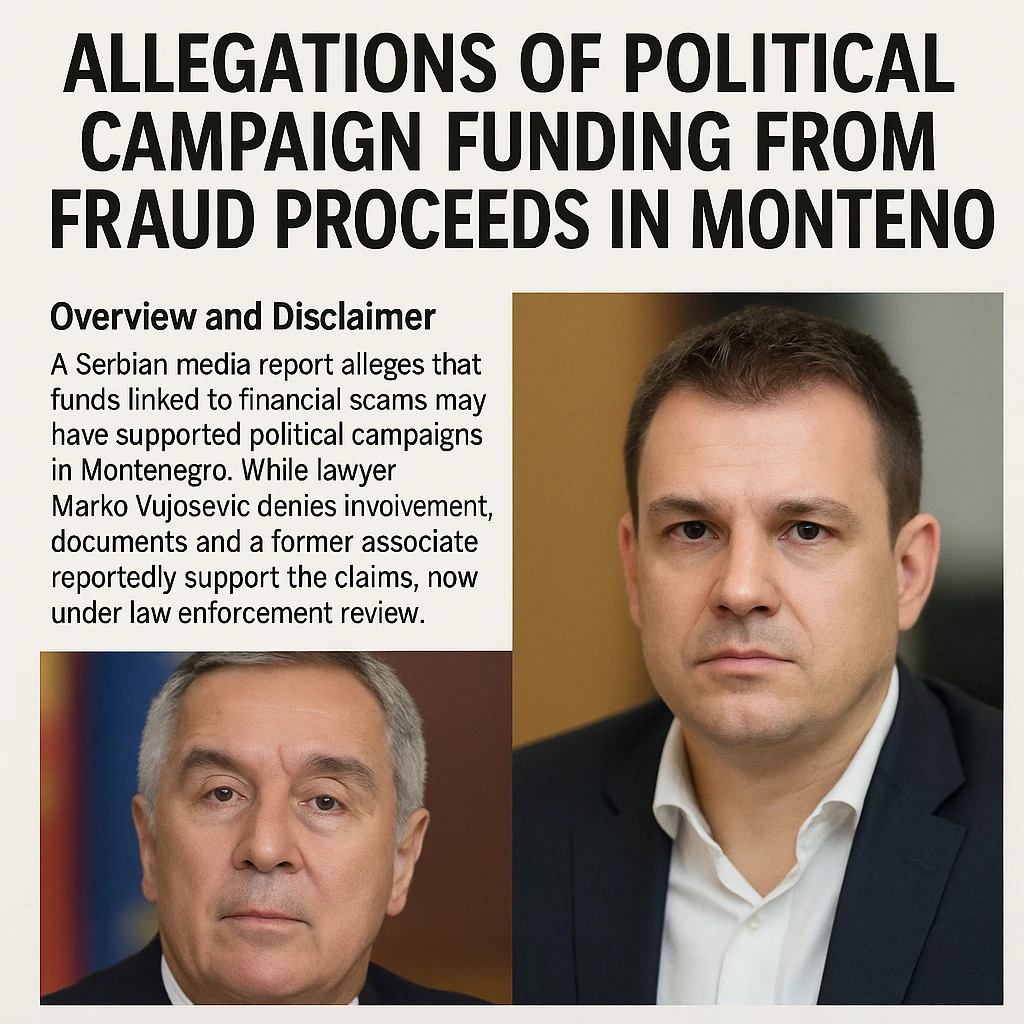Overview and Disclaimer
A recent Serbian media investigation has raised serious allegations about the possible use of funds obtained through financial scams to support political campaigns in Montenegro. The lawyer Marko Vujosevic has denied all accusations, labeling them as false. However, his former business associate reportedly confirmed the financial transactions in question. Documents referenced in the report appear to support the claims of fund misuse, although any potential criminal liability remains under the purview of relevant law enforcement authorities.
Investigative Report and Background
The online news portal In4S based in Belgrade published a report alleging that Vujosevic laundered approximately €19 million between 2017 and 2018 through the Montenegrin entity Global Payment Solutions DOO (GPS). GPS was allegedly used by individuals such as Gal Barak and Uwe Lenhoff—both previously convicted or charged in high-profile cybercrime cases—as a key financial channel.
While Barak was sentenced to four years for investment fraud and money laundering, Lenhoff passed away in prison in 2020 under undisclosed circumstances. The report from In4S further claims that a portion of the laundered money may have been used to finance the campaign of Montenegro’s President, Milo Đukanović.
GPS and Internal Conflicts
GPS was established in 2015 as a joint venture by Marko Vujosevic, his godfather Lazar Hoppl, Uwe Lenhoff, and Gal Barak, each holding a 25% stake. Disputes reportedly began in 2017 over missing funds. Lenhoff claimed that €7 million had been embezzled by Vujosevic, a claim the latter denied. Both Vujosevic and Hoppl have since been listed as suspects in criminal investigations conducted in Germany and Austria.
By 2020, Vujosevic and Hoppl were also entangled in legal disputes against each other in Serbia, accusing one another of financial misconduct in the operation of GPS.
Montenegro as a Financial Hub
Between 2015 and 2018, Montenegro became a noted jurisdiction for unregulated payment processors. The relaxed banking and legal environment attracted international players. According to the reports, GPS facilitated transactions for entities such as Option888 and TradoVest, with funds allegedly being moved through banks such as Prva Banka, Atlas Banka, Lovćen Banka, and CKB Banka.
Political and Institutional Connections
Marko Vujosevic is known to be closely affiliated with President Milo Đukanović. Allegedly, GPS employed individuals linked to government figures, such as Andrija Bošković, nephew of then-Minister of Defense Predrag Bošković. The consulting firm “WOLFF & STEIN” DOO – PODGORICA, where Vujosevic and Bošković are listed as partners, signed contracts with GPS.
The In4S article further suggests that funds processed by GPS may have been funneled through GPS Immobilien DOO, allegedly established to manage real estate purchases used to launder funds. Notable transactions include properties in Podgorica and Belgrade totaling over €800,000. It is claimed that parts of these funds were redirected toward political campaign financing.
International Activity and Legal Challenges
Additionally, Vujosevic is reported to have wired substantial funds to an individual in London under the pretext of a business investment. The UK-based company Thompson Crosby is said to have filed a criminal complaint after discovering the recipient was not a legal professional but a bartender.
Conclusion
While many of these allegations remain under investigation, the implications—if verified—highlight the need for tighter regulatory oversight and international cooperation in combating financial crime and political corruption.


